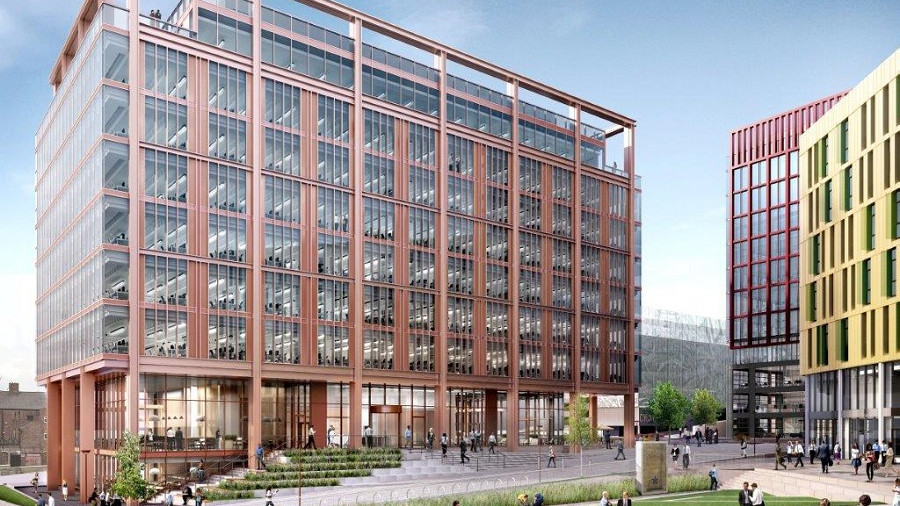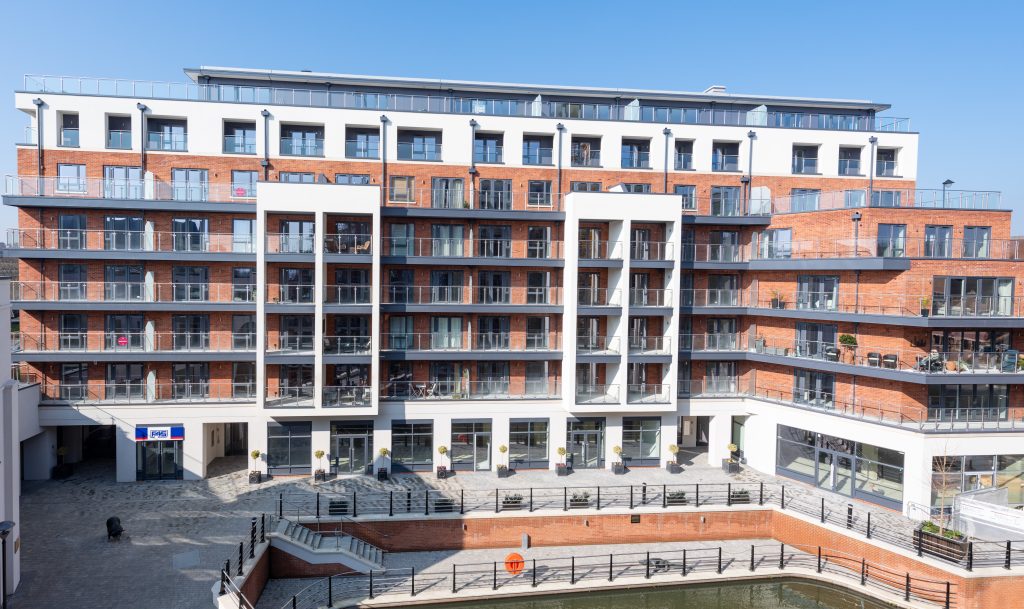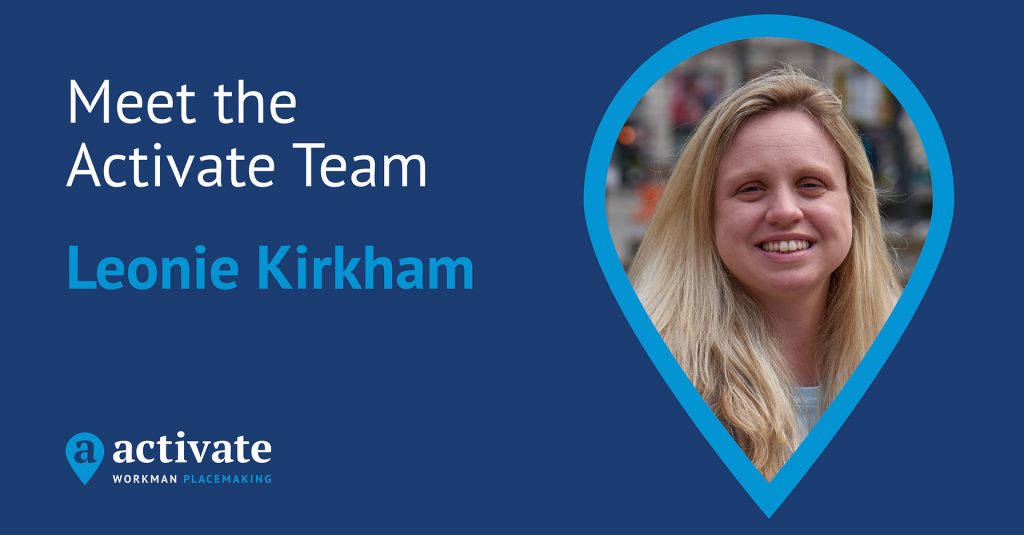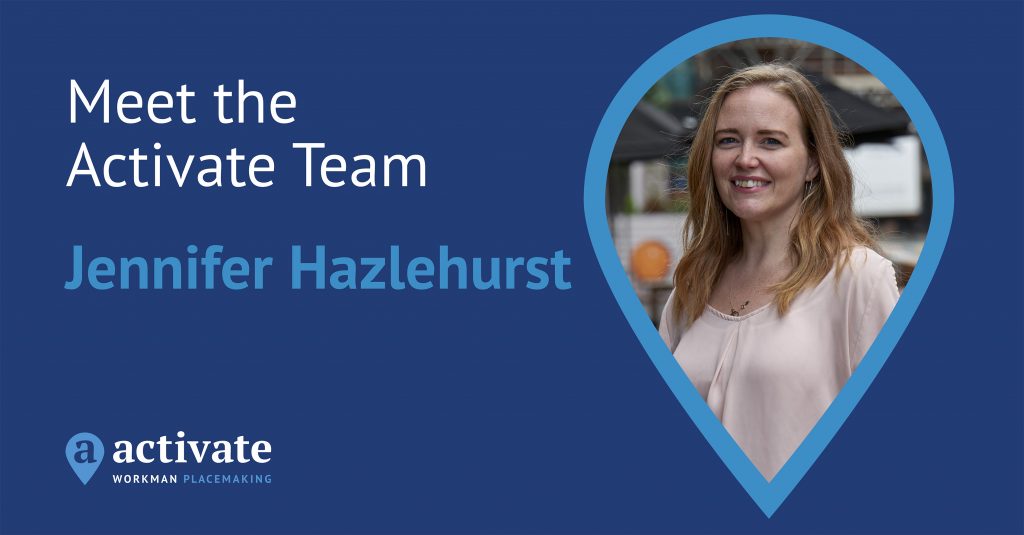
What lessons can office workspaces and retail assets can learn from each other when it comes to delivering the best tenant experience?
Retail and workplace assets alike are having to work harder than ever to deliver the best tenant experience to encourage people through their doors. Over the years, the retail sector has deployed a range of strategies to increase footfall and improve dwell times, relying on events and enlivenment such as family days, character appearances, food, and music. Today, with so many schemes no longer able to depend on the same old national retail chains, they are instead looking to smaller, local independents to occupy space, while also exploring the value of markets, and food & beverage, as a way to attract customers and build communities.
Esther Worboys, Placemaking Manager at Activate, Workman’s placemaking team, explains that retail assets are learning from other sectors in areas including community outreach and sustainability. “This is something that business parks have been doing very well for some time, and now retail is starting to adopt similar aspects of ESG such as using their wider outdoor space to for environmental and social benefits for the local community.”
Initiatives like installing beehives on site are popping up at shopping centres and retail parks as a way of delivering ESG goals as well as engaging local schools and colleges. At the NewRiver REIT plc-owned Cornmill Shopping Centre in Darlington, the introduction of bees, bird boxes and rooftop allotments, have not only added to the centre’s biodiversity, but also created community links through Darlington College and donations of produce to the local foodbank.
Better tenant experience – Cross-fertilisation of retail and commercial strategies
As Michelle Atack, Activate’s Destination Marketing Manager points out, asset managers who operate across both retail and commercial can see the benefits of strategies at one kind of asset and are starting to ask for something similar on the other. “They’re watching each other and taking a little bit of experiences from the retail element into the workspace world and vice versa,” she says.
On the flip side, although other types of commercial property are not trying to encourage spend and dwell time, they are aiming to build a network and community. And while the measurables for ROI may be less tangible for workplaces, engaging with occupiers and understanding what they want out of those community links or experiences is just as important.
“Doing the market research and understanding what occupiers want is another area where office property has learned from retail. It’s vital to find out what a particular community of people want to get involved in before organising events and activities,” says Esther.
At Workman-managed business park Croxley Park, for example, the demand is very much for family-friendly events, where everyone is welcome. The annual Croxley Park Summer Social event now includes entertainment for families and children, including bouncy castle, a roaming magician, street theatre, a DJ, cocktail-making, table-scaping, and floristry sessions. These large-scale events – popular for years across retail assets – are now a common calendar event at many commercial properties.

Harness social media as part of the tenant experience
During the pandemic, social media came into its own for commercial properties. Long utilised by retail assets to build communities of shoppers, it was harnessed by workplaces including Workman-managed Republic and Moretown, which were keen to reach out to employees with exercise tips and wellbeing content.
Post-pandemic, this strategy is vital for engaging employees who may be working from home part of the week. Social media is also being exploited at sites which are building links with local schools and local community groups.
A sense of community
Working collaboratively with local key stakeholders and partners brings greater results, and helps build and strengthen long-term relationships. Whether retail or workplace, it’s clear that building a sense of community is key to the success of real estate assets.
Community should be at the forefront of both retail and office destination marketing strategies – and campaigns to keep shoppers and employees engaged – because communities bring a sense of belonging. Over time, these initiatives improve the greater good of the wider community which properties serve and support.
Read more about our approach to Building Community across our managed portfolio.
Activate, Workman’s placemaking team, has been appointed to deliver destination marketing and community engagement at two significant office locations: Spark Foundry, part of the Newcastle Helix tech and science community in Newcastle and the Round Foundry Media Centre including Marshall’s Mill in Leeds.
The work, which is set to begin later this month, will focus on creating communities of occupiers – both on and offline – and increasing engagement. The first step often involves reaching out to occupiers through surveys and site visits to understand what kinds of networking events or online content they would like to see offered at their workplaces. The goal is to uncover the needs and aspirations of the occupiers, and once the Activate team has ascertained this, the delivery of events and online community building begins.
With transatlantic law firm, Womble Bond Dickinson set to move into 106,000 sq. ft The Spark on 30 May, community engagement strategies for employees are pivotal to create social communities at such workplaces, enabling individuals who may be employed by a variety of different occupiers to interact.
Additionally, to connect the workplaces to surrounding local communities, the Activate team is working closely with the building managers to engage with local councils, local Business Improvement Districts and other stakeholders in both Leeds and Newcastle.

Michelle Atack, Destination Marketing Manager, said: “Now that more and more occupiers are returning, while flexing their in-office days post-pandemic, it’s vital that time spent in workplaces is as valuable and meaningful as possible. Activate’s destination marketing programmes not only increase return rates, our enlivenment strategies also help create communities that teams want to be a part of, with events they don’t want to miss.”
Andrew Sparrow, Director of Placemaking, said: “During the pandemic, people were starved of human interaction, especially in the workplace. Now people are excited to get people back together so that when they are in the offices, they are learning, developing, and collaborating again which can have such a positive impact on all our mental wellbeing. Our destination marketing programmes form a cornerstone of workplace community-building that extends beyond the professional into the social, and helps people find even more reason to return.”
Activate has been instructed by Sorbon Estates to develop both Destination Marketing and Placemaking strategies for Waterside Quarter, a new mixed-use development in Maidenhead.
The appointment, led by Esther Worboys, Placemaking Manager, and Megan Bywater, Digital Marketing & Events Executive, will see the Activate team implement a fully integrated marketing and stakeholder engagement strategy for the new restaurant, retail, and leisure district.
Esther Worboys said: “We are delighted to collaborate with Sorbon Estates and Shanly Homes to develop a marketing strategy that positions Waterside Quarter as a retail and leisure destination which appeals to local residents, potential tenants, and draws in visitors from a wider catchment area.”
Waterside Quarter, which already plays host to restaurant destination Bardo Lounge and a state-of the-art F45 Fitness Studio, is set to benefit from the Activate team’s wider enlivenment experience. Their first task will be to establish engaging digital channels and a vibrant seasonal events programme, in order to raise awareness and drive footfall.
Activate will also work closely with on-site occupiers, local businesses, community organisations and the Royal Borough of Windsor and Maidenhead to create a holistic programme that positions Waterside Quarter as a dynamic and lively place to live and visit, whilst also enriching Maidenhead town centre. The town offers connections to London Paddington in 19 minutes, and easy access to some of Berkshire’s best beauty spots.

Activate has been awarded town centre redevelopment consultancy and feasibility instructions for placemaking by three new Local Authorities in the past month.
The inclusion of the Activate team on each of the three projects means their expertise will be harnessed to maximise use of government funding, where it has been allocated, either through a Town Deal or via the Future High Streets Fund.
In each case, the Activate team’s unique insight will add value and provide input into the regeneration and enlivenment of a market, as integral components of wider town redevelopment strategies.
Activate will focus on improving the integration of the three markets within their respective towns, including consideration of public realm, sight lines into the markets, and engagement with stallholders to ensure that their views and needs are incorporated into the new schemes.
Competitive benchmarking will also take place, where the Activate team will assess other markets in the area, along with other retail and leisure opportunities, in order to analyse ways in which the rejuvenated markets can each become more commercially viable and attract more footfall. Findings will be compiled into a bespoke business plan for each individual market, before regeneration work begins.
Tapping into Workman’s ESG expertise
As part of Workman, the Activate team is also able to draw on capabilities within the wider business, for example experts from our Building Consultancy and Computer Aided Design teams get involved in the feasibility and design stages.
These three market projects will also tap into the expertise of the Workman ESG team, which is delivering Energy Audits of the existing markets, along with Social Value Audits, to assess the community benefits and what markets could bring to the local area. This involves examining market supply chains, as well as gathering the views of local faith groups, the police, and schools to discover their perceptions of the market.
Esther Worboys, Placemaking Manager at Activate, and Expert for the High Streets Task Force, said: “Well-designed and located markets can deliver social value in many ways. They not only provide social spaces in terms of community seating areas and meeting places, but can support the local economy, from farm to table. Both in terms of supporting local suppliers, and acting as an incubator for entrepreneurial start-ups, markets are known to strengthen local supply chains. This often encourages healthier eating too. And with design improvements to attract more people, markets provide natural surveillance, which can also reduce crime and antisocial behaviour.”
The inclusion of the Activate team on each of the three projects means their expertise will be harnessed to optimise use of government funding, where it has been allocated, either through a Town Deal or via the Future High Streets Fund.
Want to know more?
Read more about Activate, which offers specialist placemaking and destination marketing services to regenerate, repurpose and enliven assets.
Read more about Workman’s ESG expertise
Read more about Workman’s Building Consultancy team
Months of successive national lockdowns provided consumers with the rare opportunity to accumulate high levels of savings (reaching nearly £75bn in Q1 2021, according to Statista). The ensuing summer of revenge spending brought customers back to shopping in their town centres. Now that summer is over, and with Christmas campaigns beginning against a media backdrop of inflation fears and predictions of shortages, our sector is preparing itself for the challenges of the coming months, writes Nick Hilton, Partner, Retail & Leisure, in Retail Destination magazine.
During the height of the pandemic, destination marketing quickly pivoted to digital-only strategies to maintain connections with customers and help retailers embrace click & collect, many for the first time. Digital campaigns built around creative content, seasonal interest and brand partnerships successfully helped build engagement, to the extent that for some centres, Facebook engagement increased by as much as 65% and website users by as much as 120%.
Digital gains translate to footfall growth
As locations began to reopen, destination marketing strategies evolved to incorporate hybrid physical and digital enlivenment. Average organic social media growth is at 44% per scheme so far in 2021, and website traffic for our schemes has generated more than two million visitors. These gains made in building digital communities has proven beneficial during re-openings, translating into real measurable footfall gains.
At one Leamington Spa centre, online content promoting a summer “Beats & Eats” event featuring live music on a small stage secured online engagement of more than 30%, which translated into footfall increases of 9% week on week. Results like these prove that strong online followings are a powerful tool in creating intent to visit physical destinations, especially important for reaching customers now accustomed to online shopping, or those still apprehensive of physical shopping.
Building on the continued trend of domestic tourism, creative events delivered in collaboration with the wider town centre or with retailers themselves added value to the customer experience. Response to these events is going from strength to strength, especially those such as “Walkden Into Space” which featured rocket, astronaut and alien statues, offering a socially-distanced selfie opportunity designed to drive footfall, while remaining cautious around physical contact.
Unique and engaging family activities during school holidays and weekends; alongside ticketed events that build consumer confidence via demonstrable safety measures, have performed particularly well. For example, for Halloween a ticketed escape room event for which participants stayed in their own groups, booked online, was organised alongside the usual pumpkin design and carving activities.
Tailor destination marketing to community need
Stronger digital communities also enabled centre teams to use their platforms to integrate communications plans with on-site management, ensuring customers were aware of restrictions and guidelines ahead of their visit, to manage expectations, provide clarity, and build confidence.
Balancing safety and wellbeing with customer entertainment and experience came to the fore during the remobilisation of retail. This meant adapting the marketing approach to reflect evolving operational requirements and budgets, while supporting brands, increasing footfall, and animating the retail environment.
With different regions experiencing varying levels of confidence amid continued uncertainty, this requires tailored marketing campaigns that respect local sentiment and reflect community needs. One centre felt confident enough to re-introduce workshop-based Halloween activities, while another has opted for a more cautious socially distanced outdoor approach featuring street theatre and stilt-walkers.
Digital-led marketing strategies have helped destinations retain customer interest, loyalty and engagement during the lockdowns and phased re-openings of the past 18 months. The Activate team, which produces more than 3000 pieces of digital content every month, has seen the value of quality and creativity in both digital and physical platforms. This joined up approach has kept destinations top of mind, building confidence, driving engagement, and reigniting loyalty among consumers.
To sustain the gains of summer into the Christmas shopping season and beyond, it is vital to leverage destination marketing in order to add value to the customer experience, and help local communities build confidence in their retail destinations.
By Nick Hilton, Partner, Retail & Leisure, Workman
A version of this article originally appeared in Retail Destination magazine
To find out more about the Activate Destination Marketing Service visit > https://bit.ly/3DhY11s
If you have a retail scheme, office campus or business park where the marketing needs to work harder, contact either Michelle Atack or Andrew Sparrow.
Despite lockdown and the intermittent opening and closing of retail, 2021 has seen our Activate Destination Marketing team grow rapidly.
As this infographic shows, the team is now engaging with local communities and driving footfall at more than 20 retail and leisure schemes across the country, while also taking their skills into other commercial locations.
If you have a retail scheme, office campus or business park where the marketing needs to work harder, contact either Michelle Atack or Andrew Sparrow.
Here we meet Leonie Kirkham, Digital Marketing and Events Executive within the Activate Destination Marketing team, as she answers questions about her career and approach to destination marketing…

Q: What three words describe Activate?
A: Pioneering, bold, innovative.
Q: What has been your standout moment at Activate so far?
A: Working with new accounts to support local activity and tap into key events to help boost footfall and attendance to events. It has been great to work with local social accounts to coordinate marketing online.
Q: Tell us about a time you’ve put your skills to their best use on an Activate destination marketing campaign?
A: Assisting with building copy for online marketing campaigns such as our “Be Half Term Happy” campaign. Ensuring a variety of approaches are taken to tap into key and relevant audiences to create optimum impact for our clients.
Q: Tell us about a time you’ve felt most challenged while working at Activate, and how you overcame that challenge?
A: Co-ordinating deliveries for events onsite where there were difficulties with the delivery company locating the recipient. We overcame this by working with local tenants to find a place for the product to be delivered in time for the event to go ahead.
Q: In what ways do you think the pandemic has permanently impacted destination marketing?
A: I think it has made people more cautious and led to uncertainty in the marketing sector, with some reluctant to launch back into the same kind of activity used pre-pandemic, as they are unsure of what restrictions may arise in the future.
Q: What are your spare time pursuits and how do they influence your role at Activate?
A: Exploring the outdoors and attending family events! Keeps me up to date with popular themes and allows me to experience things that work well.
Q: What is your favourite retail experience worldwide, and why?
A: The First Mall inside the Four Seasons Hotel in Cairo. It’s a beautiful timeless building with indulgent brands. Having the hotel attached brings with it added benefits and creates a full experience.
Q: What book or podcast do you recommend, and why?
A: The Harry Potter series by JK Rowling. These were responsible for getting me into reading, so always worth a reference. Also Selling War and Peace by Jack Holland keeps me rooted in my love for political science.
To find out more about the Activate Destination Marketing Service visit > https://bit.ly/3DhY11s
If you have a retail scheme, office campus or business park where the marketing needs to work harder, contact either Michelle Atack or Andrew Sparrow.
Introducing Megan Bywater, Digital Marketing and Events Executive within the Activate Destination Marketing team. Here, Megan shares her perspective on changing consumer behaviour, and the value of new technology to create post-pandemic retail experiences…

What three words describe your approach to delivering client projects?
Communication, problem-solving, and teamwork.
What has been your standout career moment so far?
Overcoming the challenges of the pandemic in my previous role. The crisis allowed us to reassess ways of working, streamline communication and become more flexible internally. Like most, we did this completely remotely and with limited resources due to redundancies. Through all the issues faced, we managed to almost double the previous year’s revenue and output in terms of project delivery, and form an even deeper relationships with our clients.
Tell us about a time you’ve felt most challenged, and how you overcame that challenge?
2020 was a challenging year for everyone, in lots of different ways. Personally, my biggest challenge was the transition to working from home indefinitely. We had a really close-knit team that valued collaboration, and I was an active member of the social committee, so ensuring everyone still felt as part of the team was a top priority. We overcame the challenge by ensuring we had regular catch ups and team meetings, and focused on communication, integrity and honesty. We came out of the pandemic with even closer relationships.
In what ways do you think the pandemic has permanently impacted destination marketing?
The shift in consumer behaviour towards purchasing goods online has been accelerated. In order to get consumers engaged and encouraged to get back on the high street, marketers must focus on seamless shopper journeys by creating an experience that goes above and beyond.
What are your spare time pursuits and how will they influence your role at Activate?
I like to go for walks and get out to the countryside. This helps my role at Activate as it allows me to visit new towns and villages that I can take inspiration from.
What is your favourite retail experience worldwide, and why?
It’s the make-up brand Charlotte Tilbury, which has “magic mirrors” in their flagship store that allow you digitally try on the brand’s signature looks. This is a great way to enhance store experiences and use technology to progress from the usual tester pots. Zara have recently worked with a digital artist to create a digital art installation for their window displays: a great example of creating more of a destination.
What book or podcast do you recommend, and why?
My favourite podcast is ‘Today in Focus’ by The Guardian. It gives insights and analysis of the current news headlines, in a really clear and concise way that’s easy to understand.
To find out more about the Activate Destination Marketing Service visit > https://bit.ly/3DhY11s
If you have a retail scheme, office campus or business park where the marketing needs to work harder, contact either Michelle Atack or Andrew Sparrow.
Having worked in the property sector for more than 15 years, Jennifer Hazlehurst, Marketing and Events Coordinator within the Activate Destination Marketing team, explains how she applies creative thinking to get the best results from clients’ destination marketing campaigns.
Q: What three words describe Activate?
A: Refreshing, energetic, collaborative.
Q: What has been your standout moment at Activate so far?
A: Activate has allowed me to develop and utilise my creative skills, finally using that A-Level in Art & Design. One of my standout moments was first seeing my creative designs come to life on both social media and websites, and following the social media engagement they allowed us to generate for our clients.
Q: Tell us about a time you’ve put your skills to their best use on an Activate destination marketing campaign?
A: Earlier in the year, with restrictions in place, we ran a lot of online campaigns around calendar events. Producing digital designs for these allowed me to use my creative skills, with one online Valentine’s competition reaching more than 16 thousand people, generating 2300-plus engagements, and proving a great campaign highlighting the site and its offers.
Q: Tell us about a time you’ve felt most challenged while working at Activate, and how you overcame that challenge?
A: Working on the destination marketing service from its launch has been exciting but trying to have that push in growing the business while also working from home, often alone with three children, has probably been my biggest challenge. A supportive and fantastic team, as well as seeing the great opportunity that was ahead of me, kept me focused to keep going and take one day at a time.
Q: In what ways do you think the pandemic has permanently impacted destination marketing?
A: The pandemic has focused marketers on achieving more with less. Following so many budgetary and physical restrictions, the pandemic has driven more innovation, seen in some brilliant digital campaigns over lockdown. Hopefully this will continue an increase in marketing campaigns that are unique and exciting, both in content and delivery.
Q: What change would you make to a single aspect of the property sector and why?
A: Having worked within the property sector for more than 15 years, there are various areas that could benefit from change. The business rates system is archaic and does no favours for either landlord or tenant. It is slow in revaluations, which then negate any savings, and has no accurate reflection on the current retail market.
Q: What are your spare time pursuits and how do they influence your role at Activate?
A: Three small children keep me busy with little real time for my own pursuits, but they do allow me to indulge my love of the outdoors and exercise by keeping them active. I love DIY and I am an avid reader. My children help develop my organisation skills (and help me stay calm in difficult situations) and I think my own pursuits encourage my innovative and creative side.
Q: What is your favourite building / retail experience worldwide, and why?
A: Having visited retail experiences as different as the mall in Dubai and the old markets in Budapest, I find it fascinating looking at how different and yet successful retail experiences can be. Whether it be an expansive, gleaming mall like Dubai’s or a crowded market steeped in history like Budapest, they can be equally emotive for such different reasons.
Q: What book or podcast do you recommend, and why?
A: As part of my degree, I studied a book called True Tales of American Life, which is a collection of stories written by people throughout America and edited by Paul Auster. It was one of the most moving books I’ve ever read. It made me laugh and cry, and showed a true insight into all aspects of human experience in an honest and refreshingly written text by everyday people.
To find out more about the Activate Destination Marketing Service visit > https://bit.ly/3DhY11s
If you have a retail scheme, office campus or business park where the marketing needs to work harder, contact either Michelle Atack or Andrew Sparrow.
Darlish is the latest occupier to maximise Activate’s ability to match occupiers with short-term void spaces at Workman-managed shopping centres.
The luxury ice cream maker has set up at the beautiful Christopher Place, St Albans, where they have taken a four-month summer lease of an otherwise void space.
With access to a large pedestrianised area outside the shop, customers can linger outside, creating a lively energy and buzz around the shop and in the centre, even with Covid restrictions in place.
Being a seasonal business, Darlish has a few key months in which to showcase its products. The store Christopher Place gives the brand an amazing amount of frontage, allowing an opportunity to play with interior design.
“Having a calm space to move around in has been fantastic,” Darlish reported. “Even with queues, which can get very long in summer, serving hundreds of ice creams is a breeze! Customers have even commented on how much they love the shop, thanks to Activate for making it possible.”

To find out more about the Activate Destination Marketing Service visit > https://bit.ly/3DhY11s
If you have a retail scheme, office campus or business park where the marketing needs to work harder, contact either Michelle Atack or Andrew Sparrow.








